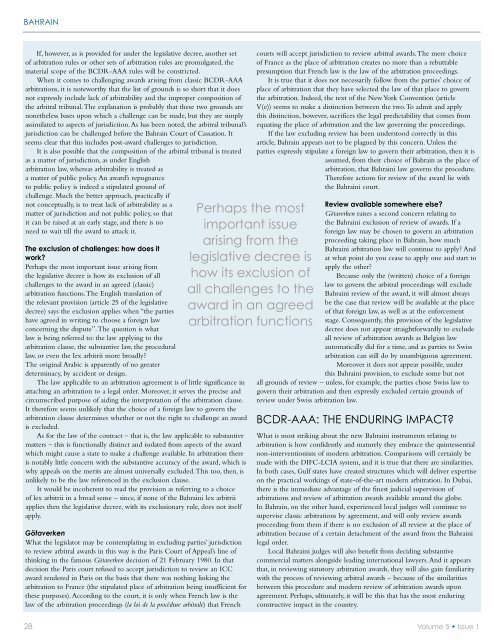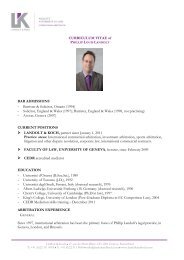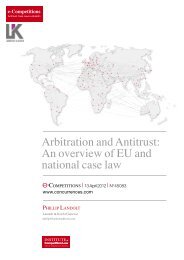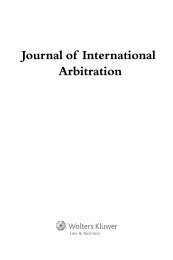Known
View Document - Landolt & Koch
View Document - Landolt & Koch
Create successful ePaper yourself
Turn your PDF publications into a flip-book with our unique Google optimized e-Paper software.
BAHRAIN<br />
If, however, as is provided for under the legislative decree, another set<br />
of arbitration rules or other sets of arbitration rules are promulgated, the<br />
material scope of the BCDR-AAA rules will be constricted.<br />
When it comes to challenging awards arising from classic BCDR-AAA<br />
arbitrations, it is noteworthy that the list of grounds is so short that it does<br />
not expressly include lack of arbitrability and the improper composition of<br />
the arbitral tribunal. The explanation is probably that these two grounds are<br />
nonetheless bases upon which a challenge can be made, but they are simply<br />
assimilated to aspects of jurisdiction. As has been noted, the arbitral tribunal’s<br />
jurisdiction can be challenged before the Bahrain Court of Cassation. It<br />
seems clear that this includes post-award challenges to jurisdiction.<br />
It is also possible that the composition of the arbitral tribunal is treated<br />
as a matter of jurisdiction, as under English<br />
arbitration law, whereas arbitrability is treated as<br />
a matter of public policy. An award’s repugnance<br />
to public policy is indeed a stipulated ground of<br />
challenge. Much the better approach, practically if<br />
not conceptually, is to treat lack of arbitrability as a<br />
matter of jurisdiction and not public policy, so that<br />
it can be raised at an early stage, and there is no<br />
need to wait till the award to attack it.<br />
The exclusion of challenges: how does it<br />
work?<br />
Perhaps the most important issue arising from<br />
the legislative decree is how its exclusion of all<br />
challenges to the award in an agreed (classic)<br />
arbitration functions. The English translation of<br />
the relevant provision (article 25 of the legislative<br />
decree) says the exclusion applies when “the parties<br />
have agreed in writing to choose a foreign law<br />
concerning the dispute”. The question is what<br />
law is being referred to: the law applying to the<br />
arbitration clause, the substantive law, the procedural<br />
law, or even the lex arbitrii more broadly?<br />
The original Arabic is apparently of no greater<br />
determinacy, by accident or design.<br />
The law applicable to an arbitration agreement is of little significance in<br />
attaching an arbitration to a legal order. Moreover, it serves the precise and<br />
circumscribed purpose of aiding the interpretation of the arbitration clause.<br />
It therefore seems unlikely that the choice of a foreign law to govern the<br />
arbitration clause determines whether or not the right to challenge an award<br />
is excluded.<br />
As for the law of the contract – that is, the law applicable to substantive<br />
matters – this is functionally distinct and isolated from aspects of the award<br />
which might cause a state to make a challenge available. In arbitration there<br />
is notably little concern with the substantive accuracy of the award, which is<br />
why appeals on the merits are almost universally excluded. This too, then, is<br />
unlikely to be the law referenced in the exclusion clause.<br />
It would be incoherent to read the provision as referring to a choice<br />
of lex arbitrii in a broad sense – since, if none of the Bahraini lex arbitrii<br />
applies then the legislative decree, with its exclusionary rule, does not itself<br />
apply.<br />
Götaverken<br />
What the legislator may be contemplating in excluding parties’ jurisdiction<br />
to review arbitral awards in this way is the Paris Court of Appeal’s line of<br />
thinking in the famous Götaverken decision of 21 February 1980. In that<br />
decision the Paris court refused to accept jurisdiction to review an ICC<br />
award rendered in Paris on the basis that there was nothing linking the<br />
arbitration to France (the stipulated place of arbitration being insufficient for<br />
these purposes). According to the court, it is only when French law is the<br />
law of the arbitration proceedings (la loi de la procédure arbitrale) that French<br />
Perhaps the most<br />
important issue<br />
arising from the<br />
legislative decree is<br />
how its exclusion of<br />
all challenges to the<br />
award in an agreed<br />
arbitration functions<br />
courts will accept jurisdiction to review arbitral awards. The mere choice<br />
of France as the place of arbitration creates no more than a rebuttable<br />
presumption that French law is the law of the arbitration proceedings.<br />
It is true that it does not necessarily follow from the parties’ choice of<br />
place of arbitration that they have selected the law of that place to govern<br />
the arbitration. Indeed, the text of the New York Convention (article<br />
V(e)) seems to make a distinction between the two. To admit and apply<br />
this distinction, however, sacrifices the legal predictability that comes from<br />
equating the place of arbitration and the law governing the proceedings.<br />
If the law excluding review has been understood correctly in this<br />
article, Bahrain appears not to be plagued by this concern. Unless the<br />
parties expressly stipulate a foreign law to govern their arbitration, then it is<br />
assumed, from their choice of Bahrain as the place of<br />
arbitration, that Bahraini law governs the procedure.<br />
Therefore actions for review of the award lie with<br />
the Bahraini court.<br />
Review available somewhere else?<br />
Götaverken raises a second concern relating to<br />
the Bahraini exclusion of review of awards. If a<br />
foreign law may be chosen to govern an arbitration<br />
proceeding taking place in Bahrain, how much<br />
Bahraini arbitration law will continue to apply? And<br />
at what point do you cease to apply one and start to<br />
apply the other?<br />
Because only the (written) choice of a foreign<br />
law to govern the arbitral proceedings will exclude<br />
Bahraini review of the award, it will almost always<br />
be the case that review will be available at the place<br />
of that foreign law, as well as at the enforcement<br />
stage. Consequently, this provision of the legislative<br />
decree does not appear straightforwardly to exclude<br />
all review of arbitration awards as Belgian law<br />
automatically did for a time, and as parties to Swiss<br />
arbitration can still do by unambiguous agreement.<br />
Moreover it does not appear possible, under<br />
this Bahraini provision, to exclude some but not<br />
all grounds of review – unless, for example, the parties chose Swiss law to<br />
govern their arbitration and then expressly excluded certain grounds of<br />
review under Swiss arbitration law.<br />
BCDR-AAA: THE ENDURING IMPACT?<br />
What is most striking about the new Bahraini instruments relating to<br />
arbitration is how confidently and maturely they embrace the quintessential<br />
non-interventionism of modern arbitration. Comparisons will certainly be<br />
made with the DIFC-LCIA system, and it is true that there are similarities.<br />
In both cases, Gulf states have created structures which will deliver expertise<br />
on the practical workings of state-of-the-art modern arbitration. In Dubai,<br />
there is the immediate advantage of the finest judicial supervision of<br />
arbitrations and review of arbitration awards available around the globe.<br />
In Bahrain, on the other hand, experienced local judges will continue to<br />
supervise classic arbitrations by agreement, and will only review awards<br />
proceeding from them if there is no exclusion of all review at the place of<br />
arbitration because of a certain detachment of the award from the Bahraini<br />
legal order.<br />
Local Bahraini judges will also benefit from deciding substantive<br />
commercial matters alongside leading international lawyers. And it appears<br />
that, in reviewing statutory arbitration awards, they will also gain familiarity<br />
with the process of reviewing arbitral awards – because of the similarities<br />
between this procedure and modern review of arbitration awards upon<br />
agreement. Perhaps, ultimately, it will be this that has the most enduring<br />
constructive impact in the country.<br />
28 Volume 5 • Issue 1





